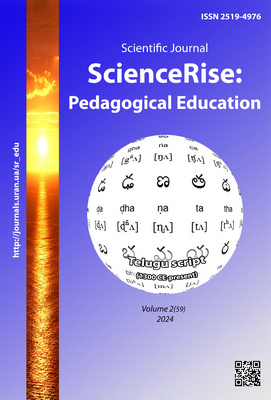Comparative analysis of the "human - AI" system
DOI:
https://doi.org/10.15587/2519-4984.2024.302053Keywords:
artificial intelligence, education, communication, information, information technologies, society, research, futureAbstract
The article highlights the historical foundations of the emergence of information systems that led to the creation of artificial intelligence (AI) in the context of technological development processes, and provides definitions of key concepts. To better understand the essence of the article, through comparative analysis, the views of prominent contemporary figures on the development of artificial intelligence and the diversity of opinions regarding the application of innovative technologies are elucidated. The detachment from reality is observed in both optimistic and pessimistic forecasts due to the lack of scientific substantiation. The diversity of opinions is explained by the fact that most scientists focus on specific aspects (business, politics, physics, neurobiology), rather than on the specific technology of artificial intelligence. The article reveals the ambivalence of views of different groups of experts on the impact of the implementation of new technological processes. Sociologists, historians, and philosophers perceive these technologies with caution, assessing their impact on society and the individual, while companies developing new technologies often exaggerate their significance to promote their products. The right decision would be to unite many fields to achieve a common goal - creating the desired future of the "human-AI" system. Bringing together different sciences (philosophy, psychology, law, physics, mathematics, biology), exchanging experiences, and creating specialized organizations, institutes can help change the polarization of views and find answers to questions that have already arisen and may arise in the future. The activities of research organizations that will explore aspects of technological progress should perform a unifying function between opposing views, balancing the process of hybridization of the real and virtual worlds. The question of the impact of artificial intelligence on the future of humanity remains open. Fruitful cooperation between humans and machines looks promising and requires the correct setting of goals and regular monitoring of the process of this system, understanding the significance of new technologies. The author emphasizes the importance of addressing these issues, as the development of technologies is constantly growing and leaves no time for controversy
References
- Kharari, Yu. N. (2023). 21 urok dlia 21 stolittia. Kyiv: Bukshef, 416.
- Tegmark, M. (2019). Zhyttia 3.0. Doba shtuchnoho intelektu. Kharkiv: Nash format, 432.
- Trofimov, V. V. (2015). Informatsiini tekhnolohii. Vol. 1. Moscow: Vydavnytstvo Yurait, 238. Available at: https://stud.com.ua/35734/informatika/informatsiyni_tehnologiyi
- Etapy rozvytku informatsiinykh tekhnolohii. Tsyfrovi tekhnolohii v naukovykh doslidzhenniakh. Available at: https://tech4science.wordpress.com/2019/11/17/етапи-розвитку-інформаційних-технол/
- Perspektyva rozvytku elektronno-obchysliuvalnoi tekhniky i zasobiv avtomatyzatsii. Urok 10. Informatsiini tekhnolohii. Available at: https://infohmc5.blogspot.com/p/10.html
- Tomashevskyi, O. M., Tsehelyk, H. H., Viter, M. B., Dubuk, V. I. (2012). Informatsiini tekhnolohii ta modeliuvannia biznes-protsesiv. Kyiv: TsUL, 296. Available at: https://pidru4niki.com/12710107/informatika/tehnologiyi_modelyuvannya_biznes-protsesiv_mova_uml
- Poniattia pro shtuchnyi intelekt. UA5.org. Materialy z informatsiinykh tekhnolohii. Available at: https://ua5.org/technol/1683-ponyattya-pro-shtuchnyj-intelekt.html
- Krasnomovets, P. (2016). 10 mifiv pro shtuchnyi intelekt. AIN.UA. Available at: https://ain.ua/2016/05/29/10-mifiv-pro-shtuchnyj-intelekt/
- Davyhora, O. (2023). Mask zaiavyv, shcho shtuchnyi intelekt predstavliaie ryzyk dlia liudstva. UNIAN. Available at: https://www.unian.ua/science/mask-zayaviv-shcho-shtuchniy-intelekt-predstavlyaye-rizik-dlya-lyudstva-12443025.html
- Palyvoda, N. (2017). Stiven Khokinh: shtuchnyi intelekt mozhe staty naihirshym vynakhodom liudstva. Mind.ua. Available at: https://mind.ua/news/20178313-stiven-hoking-shtuchnij-intelekt-mozhe-stati-najgirshim-vinahodom-lyudstva
- Shevchenko, A. (2024). Chy poperedzhav Stiven Hokinh, shcho shtuchnyi intelekt mozhe oznachaty kinets liudskoi rasy? Top-AI. Available at: https://top-ai.com.ua/perevirka-faktiv/chy-poperedzhav-stiven-goking-shho-shtuchnyj-intelekt-mozhe-oznachaty-kinecz-lyudskoyi-rasy/
- Novella, S. (2021). Putivnyk Usesvitom dlia skeptykiv. Yak znaty, shcho spravdi pravda u sviti, de vse bilshe brekhni. Kharkiv: Zhorzh, 536.
- Tymofieiev, O. (2023). Stiven Khokinh: «Shtuchnyi intelekt nese nebezpeku liudstvu». Spravy Simeini. Available at: https://familytimes.com.ua/innovatsiyi-nauka/stiven-khokinh-shtuchnyy-intelekt-nese
- Yahori, Ya. (2024). Peremohty smert. Zavdiaky yakym novitnim tekhnolohiiam liudyna zhytyme vichno? Ekonomichna pravda. Available at: https://www.epravda.com.ua/publications/2024/01/17/708557/
- Maibutnie chy kinets? Rozpovidaiemo pro pryklady zaluchennia ShI v rizni sfery zhyttia (2023). Telegraf.Design. Available at: https://telegraf.design/majbutnye-chy-kinets-rozpovidayemo-pro-pryklady-zaluchennya-shi-v-rizni-sfery-zhyttya/
- Cooper, R. G. (2024). The AI transformation of product innovation. Industrial Marketing Management, 119, 62–74. https://doi.org/10.1016/j.indmarman.2024.03.008
- Conn, A. (2024). Benefits & Risks of Artificial Intelligence. Future of life. Available at: https://futureoflife.org/ai/benefits-risks-of-artificial-intelligence/
- Artificial Intelligence Poses “Extinction Risk” To Humanity Says Oxford University`s Stuart Armstrong (2014). Huffpost. Available at: https://www.huffingtonpost.co.uk/2014/03/12/extinction-artificial-intelligence-oxford-stuart-armstrong_n_4947082.html
Downloads
Published
How to Cite
Issue
Section
License
Copyright (c) 2024 Остап Залужець

This work is licensed under a Creative Commons Attribution 4.0 International License.
Our journal abides by the Creative Commons CC BY copyright rights and permissions for open access journals.
Authors, who are published in this journal, agree to the following conditions:
1. The authors reserve the right to authorship of the work and pass the first publication right of this work to the journal under the terms of a Creative Commons CC BY, which allows others to freely distribute the published research with the obligatory reference to the authors of the original work and the first publication of the work in this journal.
2. The authors have the right to conclude separate supplement agreements that relate to non-exclusive work distribution in the form in which it has been published by the journal (for example, to upload the work to the online storage of the journal or publish it as part of a monograph), provided that the reference to the first publication of the work in this journal is included.








